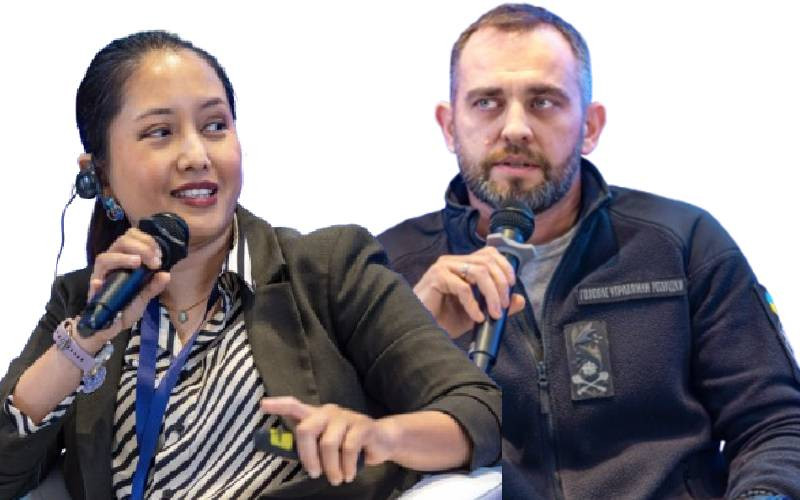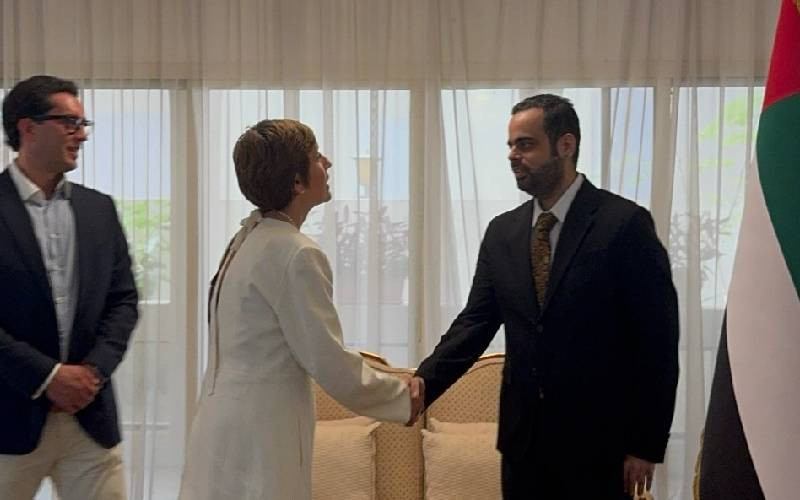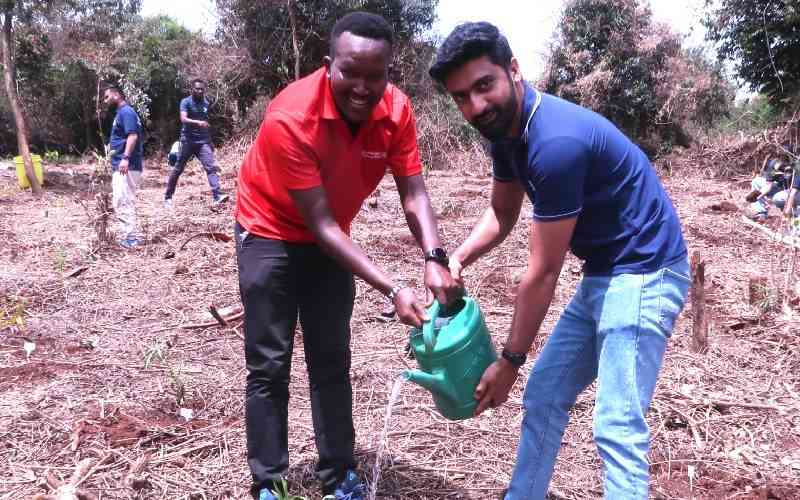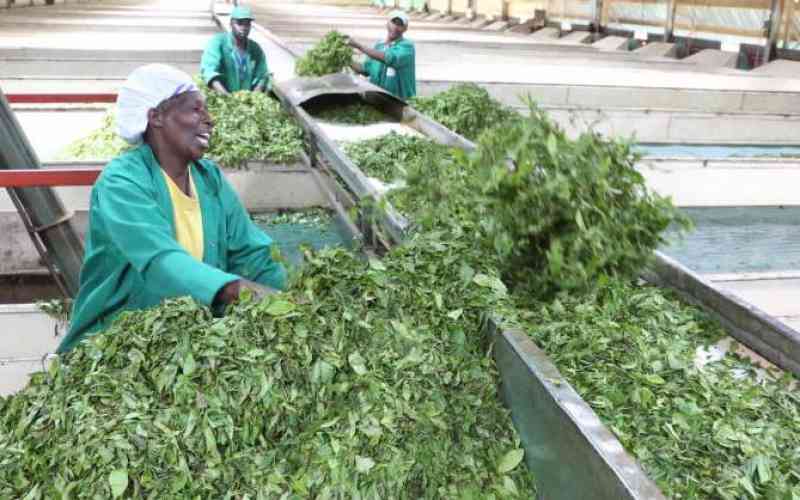Munira Mustafa, CEO, Chasseur Group research and Gen Dmytro Usov, Secretary Prisoners of War, Military HQ-Ukraine addressing an international sitting discussing Russia's war on Ukraine. [Wellingtone Nyongesa, Standard]

As the Foreign Affairs Ministry battles to manage enquiries by families of Kenyans trapped on the frontlines of Russia’s war against Ukraine, it is emerging that the country could have fallen victim to Russian leader Vladimir Putin’s decree to recruit foreigners into its war against Ukraine after Russians refused to join.
Ukraine’s Secretary of the Coordination Headquarters for the Treatment of Prisoners of War, Brigadier General Dymytro Usov, told a session bringing together international experts on Military and security sectors, that following the Russian strategy to recruit foreigners into its army, the number of foreigners recruited to fight against Ukraine has grown larger than active personnel in 21 European countries, including Croatia and Austria.
“In total, today Russia has enlisted 18,800 individuals from mostly the Global south, the numbers are larger than the army of Austria, which has 16,000 active personnel and Croatia which has 14, 325”
General Usov said that while citizens of Nepal, a country that fell victim to Russian entities luring its citizens into the Russian army, have since reduced, India and Kenya have continued to show an increase in citizens signing contracts to join.
The military official did not explain whether the signing by Kenyans was voluntary or by coercion.
The Standard learns that months after launching his full-scale war against Ukraine, Putin got a rude awakening that he had got into a long-drawn campaign that needed more numbers in his armies. That unflattering fact came to him after his armies faced surprising resistance from Ukrainian armies on the outskirts of Kyiv in March 2022, causing them to pull an unexpected retreat.

Gen Dmytro Usov, Secretary Prisoners of War, Military HQ-Ukraine addressing an international sitting discussing Russia's war on Ukraine. [Wellingtone Nyongesa, Standard]
Malaysia-based Chasseur Group, an experienced global military and security research body, while delivering its latest report at the Kyiv session, said that months into the war, Russia found itself losing at least 1000 lives per day. Moscow resorted to replenishing the losses by generating 30,000 to 40,000 recruits per month to offset the casualty rates.
READ: Putin's bloodshed in Ukraine shows Russia's extermination tendencies
Initially, thousands of Russians signed military contracts with Moscow, reportedly building up reserve forces. But the financial burden has become crushing. Russia’s volunteer recruitment system is dependent on ever-increasing cash incentives and was draining the state coffers, destabilising the domestic labour market through wage inflation.
For Putin, mass mobilisation as an alternative remained political suicide after his September 2022 call triggered 261,000 Russians to flee the country to avoid conscription into the army.
The Kremlin quickly shelved that option.
“Previously, only Russian Federation citizens were allowed to serve in the Russian army," Said Munira Mustafa, Chief Executive of Chasseur. “In July 2025, Putin signed a decree allowing foreigners to serve during mobilisation. A significant expansion of Russia’s existing foreign recruitment laws. What the decree did not specify was how the foreigners would be recruited”
Stay informed. Subscribe to our newsletter
Putin had built a global trafficking pipeline that sent casualties to the Global South- saving his own countrymen from death on the front lines. A sprawling network now reportedly stretches from Kathmandu, Nepal, to Dhaka- Bangladesh, to Nairobi- Kenya, to San Jose Costa Ricca, luring desperate men with false promises of construction work, warehouse jobs, or any legitimate opportunity.
In Kenya, the Department of Diaspora Affairs has been reluctant to admit the sheer numbers of Kenyans duped into serving on the Russian frontlines, even as it claims to be working night and day to save Kenyans who have made contact with the embassy in Moscow. Our sources in Russia, among them men duped to serve on the frontlines, have counted upwards of 400 Kenyans.
Munira Mustafa, CEO, Chasseur Group research addressing an international sitting discussing Russia's war on Ukraine. [Wellingtone Nyongesa, Standard]

Ukraine’s Foreign Minister Andrii Sybiha recently posted that 1436 individuals from Africa have been forced into fighting for Russia on the frontlines in its war against Ukraine.
By early this month, The Standard had established that Kenya’s Mission in Moscow had made contact with at least 80 Kenyans crying out for help and needed to be saved from coerced service.
ALSO READ: How Kenyans became direct victims of Russia war in Ukraine
Today as Kenya’s ambassador to Russia Peter Mathuki implements the orders of his boss, Musalia Mudavadi, following successive pressure from families demanding for answers, experts on Russia’s war methods have urged caution from governments in the Global South not to allow their citizens to travel to Russia for supposed promises of jobs.
Men who have been recruited from the streets of Nairobi after being promised such jobs and only wake up to the bitter truth after landing in Moscow or St Petersburg have disturbing accounts of their experiences in Russia.
A returnee who gave his story to The Standard last month, who has kept his contact with us speaks of racism and being dehumanised by Russian commanders while he served.
“Those Russians don’t give a damn whether you live or die. I saw many injured Africans left on the battlefield to die after being hit by Ukrainian drones. The Russian sergeant would say ‘leave that one, he is going to die anyway. ’ I still feel I am lucky for coming back alive," he told The Standard.
We have since resolved to protect his identity after he expressed fears for his life, soon after being helped by the Kenyan embassy in Moscow to make it back into the country.
Men from Africa, Asia, Latin America and Southeast Asia have continued to be duped onto the frontlines of Russia's wars, where, like wheat stalks, when they fall in the field,s they are left to rot and provide fertiliser for the next planting season.
According to the Chasseur Group report, Putin’s decree on the recruitment of foreigners into his army left a loophole by refusing to spell out the legal framework that would be followed, including signing deals with like-minded countries “That was not an oversight, it was a tactful action to allow deceptive recruitments from poor nations where people need jobs” Said Munira.







